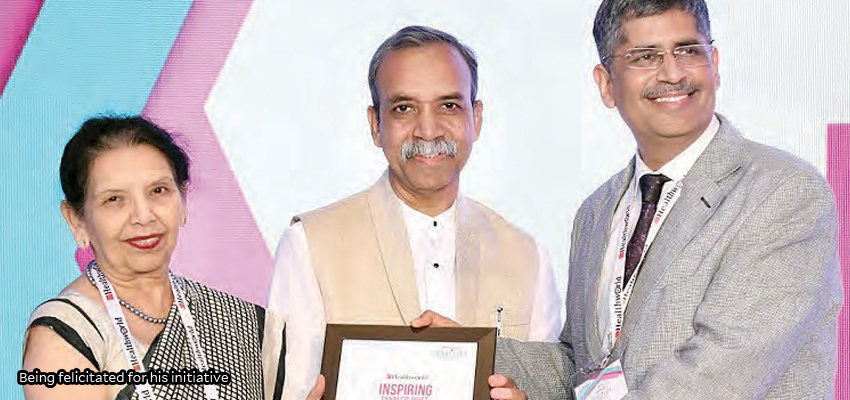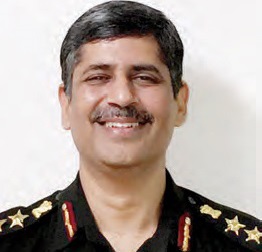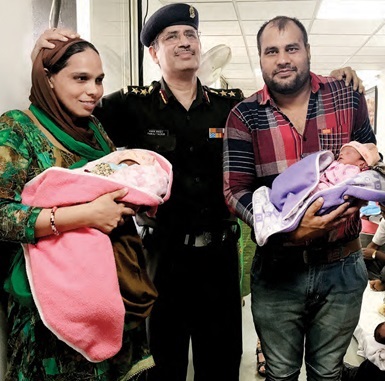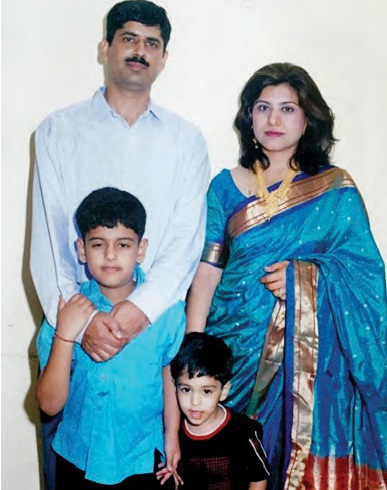Bringing a Paradigm Shift

It takes gumption to relinquish the prestigious rank of a Brigadier and head into Civvy Street to pursue a noble cause. Dr Prof (Col.) Pankaj Talwar, who calls himself the chosen one, did exactly that and proved his mettle in the field of fertility. A renowned fertility specialist in India, Dr Talwar has performed over 21,000 IVF cycles with a consistent 55%+ clinical pregnancy rate over the past three decades. He is currently the Head of Medical Services at Birla Fertility and IVF.
He is the recipient of the prestigious Vishisht Seva Medal, awarded by the President of India for his work in the field of Assisted Reproductive Technologies (ART) and fertility medicine. During his tenure with the Armed Forces, he set up seven ART clinics in India and abroad. He has also been awarded the Lifetime Achievement Award from LKO, Indian Fertility Society. Dr Prof (Col.) Pankaj Talwar traces his meritorious journey from the military to medicine in an interview with Corporate Citizen
-By Namrata Gulati Sapra
Corporate Citizen: What inspired you to join the Armed Forces?
Dr Prof (Col.) Pankaj Talwar: Becoming a Para Commando always fascinated me. The idea of the Black Cats jumping from the choppers, doing something adventurous fascinated me. My parents initially didn’t allow me to join the Army. Then a brilliant idea hit me, which was to become a doctor at Armed Forces Medical College, Pune (AFMC), my alma mater. This would enable me to join the Army.
CC: Tell us about your journey in the Forces.
After getting into the AFMC in the 90s, it was my dream to do something noble, not knowing exactly what was I getting into. I completed my MBBS from Pune, followed by my internship at Military Hospital, Bareilly. Just two days later, they asked me to pack my bags and move to Leh-Ladakh. I took an aircraft from Chandigarh and upon landing there, the temperature was about -20 degrees Celsius and it was all full of snow. It was all very exciting and just after 10 days, we moved to OP-Meghdoot. That is where the main battle between India and Pakistan was going on. We were at a height of 17,000 feet and the temperature was about minus forty. We stayed in a Russian tent and every night, we used to pump in some oxygen and go to sleep in a sleeping bag. We never took bath for about five months. There was no water. The firing used to go on throughout the night.
The best part was that we used to stay in an ice cave. It was very challenging for me as a doctor because there were so many illnesses that we could help with. We were able to do a good job and saved a few lives. The Army provided me with such a wonderful opportunity to be there at the border and train myself to be a bit of an artillery officer taking artillery gunfire and firing weapons. We had a wonderful time in Ladakh. I spent around five months there, and then moved down to Kashmir where I spent two-and-a-half years and thereafter, went to AFMC, Pune for my MD in Gynaecology.
"Being a senior advisor and having already given approximately 22-23 years to the Army, going out and exploring more, excited me. My career was also looking good as a recipient of the President’s Award"
-Dr Prof (Col.) Pankaj Talwar
CC: Despite having such a fruitful career in the Army, when was the first time you decided that you wanted to switch over to the other side?
It was decided that I would switch over after becoming a full Colonel in 2011. Being a senior advisor and having already given approximately 22-23 years to the Army, going out and exploring more, excited me. My career was also looking good as a recipient of the President’s Award. It was my dream to serve the country in a different way and have more outreach as more people needed my expertise. But I couldn’t leave and had to serve for eight more years. During that time, five ART units for the Indian Army were raised by me. Later, when I got approved for the rank of a Brigadier and had a choice to either wear my Rank or leave. That’s the time when my application got approved and I finally left in 2019.
CC: It was a high point in your life when you got approved for an esteemed rank like the Brigadier, yet you chose to relinquish it. Is it because you felt that the career trajectory and the growth opportunities in the Army are quite limited as compared to life in Civvy Street as a doctor?

The decision to leave was not because the Army didn’t have options or because of being superseded. I was doing very well and was approved for the rank of a Brigadier, and would have become a General soon. Everything seemed to be in my favour and being the recipient of many awards and accolades left me humbled. My tenure at the Army Hospital was thirteen plus years, out of which, seven years being the HoD. Having reached the pinnacle of my career in the Army, I left for a different purpose. I thought, there would be no challenge in life. In case I become a General, where would that take me finally? It was to test myself; whether I could prove that I still have it in me after switching to Civvy Street. In the Army, when you are heading such an elite organisation as the Army Hospital, you are like a king. I wanted to switch and start from scratch to prove myself.
CC: It is a well-known fact that life in the Army and life in Civvy Street is very different as a profession. How difficult or easy was the transition for you?
At the outset, it took me some time as coming from an extremely busy organisation, being the Director of multiple units, and doing around 130 cases per month. The people there knew me very well. However, on Civvy Street, I was an unknown person and didn’t know the ways of Civvy Street. But I eventually got the hang of things and it took me around 7-8 months to prove my worth. I am currently the Head of Medical Services at Birla Fertility and IVF and doing pretty well. I don’t wear my uniform, yet work around 14 hours a day. There is not much of a difference.
CC: Do you miss the thrill that the Army life offers such as postings across India, the uncertainty, and the lifestyle?
It’s missed every day. The Army is in my blood. I owe everything to the Army. I love it so much that we have got my son into The Army College of Medical Sciences to become a doctor. Despite the fact that he was getting admission to all the good colleges, I insisted that he joined there.
Yes, the opportunities in the Army are less as compared to Civvy Street. The power of expression is quite limited. On many occasions when we were covered by PTI and other media agencies, a whole lot of permissions were to be sought before speaking as in how and what to say. Now in the corporate world, I feel like an ordinary citizen because of the freedom to talk freely without any permissions required.
CC: What motivated you to take up fertility as your area of specialisation?
I have always believed in women’s empowerment. But in the Army, we are exposed to men whose wives are from small villages and they hardly get to meet their wives for more than a month or so in a year. A majority of them are facing infertility issues because they don’t stay together. Even when they are on a leave, they don’t get a chance to plan it. The women are facing this trauma alone. In villages, it is such a big issue that the couples get separated under societal pressure. It is not even clear whether the issue is with the man or the wife. The women are not being treated with dignity. Therefore, infertility felt like the biggest problem in our country to me. So, I thought of taking up this branch to help these women. I opted for Gynaecology as it was the best suited for my temperament and then put my expertise in gynaecology to use in the field of infertility to help these people. This thought struck me in 1994 when the field of infertility was quite primitive. I opted for it and got myself trained for it.
"The Army is in my blood. I owe everything to the Army. I love it so much that we have got my son into The Army College of Medical Sciences to become a doctor. Despite the fact that he was getting admission to all the good colleges, I insisted that he joined there"
CC: As you mentioned before, you are a proponent of women’s empowerment. What, in your opinion, should be done differently to empower women?
We wear different types of glasses when we speak to people in different roles. The stigma is still there. There is no paradigm shift in our communities. It will take some time. Women are getting empowered in bigger cities. They get married late. I am a strong proponent of women’s fertility. So, all women should have equal space as men do.
As my wife is a Paediatrician and she is a national topper. Now in any similar case, when a couple gets married, the wife is supposed to bear a child within 2-3 years of marriage. About 2-4 years of her life are committed to taking care of a newborn. Another two years down the line, she bears another child and another 2 to 3 years are gone. She gives about 7-8 years of the prime of her work life to bring up kids. It is a very big responsibility which a woman carries out by putting her career at stake. All this while the husband keeps on growing in his profession. At about 40-45 years of age, when she decides to resume her career, she faces so many challenges like losing touch, having younger competitors at work etc. She feels badly hit.
I strongly feel that we have to support our women in their professional growth, otherwise, as Swami Vivekananda said in 1983, after coming back from the parliament of Chicago, “ The thing I liked most about the US is that women walk in front and the men walk behind.”
So, in any country where women walk behind men, the community can never rise. Women should have a right to work, to have financial security, empowerment and the right to dignity.
My dream is to reach every nook and corner of the country with the help of Birla Infertility and to help every woman who is being called a baanjh (infertile). They should have access to a medical facility wherein, they can walk in with their husbands and be accurately diagnosed for the causes of infertility. In 30-40 per cent of cases, the issue is with the husband. Five out of every 10 cases, the husbands have a psychosexual disorder about which women cannot talk and men will never tell. So, women should have such avenues in the rural areas as well.
"My dream is to reach every nook and corner of the country with the help of Birla Infertility and to help every woman who is being called a baanjh (infertile). They should have access to a medical facility wherein, they can walk in with their husbands and be accurately diagnosed for the causes of infertility"
CC: During your tenure with the Army, you set up five ART centres. Please tell us about that.
 Before relinquishing the uniform
Before relinquishing the uniformWe set up one at the Army Hospital, one each at Bhatinda, Mumbai and Guwahati, and one for the Bangladesh Army, which is the biggest unit in Bangladesh. Initially, we had only one centre at the Army Hospital in New Delhi, yet we were doing about 150 cases per month which was the highest number in the country. A lot of people had to travel long distances to reach us. So, our DGAFMS (Director General Armed Forces Medical Services) decided to start a programme where the infertility centres could reach people. That’s how all these centres came up. Another one has come up in Jalandhar now. With all these units coming up, the women won’t have to travel for treatment. It is quite easy for men to travel but it uproots a woman if she has to travel for a few months for the treatment as she has many domestic and social responsibilities. Our aim is to setup units near their homes. The most exciting was to set up a unit for Bangladesh Army. Bangladesh has a large number of male infertility cases. It was indeed one of the most exciting assignments.
CC: You are the Senior Vice President of the Indian Fertility society. The journey to the position must have been arduous.
As expressed earlier, I always feel that I have been the chosen one. I joined the Army as a Captain and would have left as a General. At one point in time, I realised that I was working for a minimum of 18 hours a day and spending just three hours at home. I had very rich experiences in the cases of cancer and infertility. We were doing so much but felt that we were confined in a shell and were not communicating enough.
We had a National Congress on Infertility in 2005-06, in which I was also a participant, very young though. We had big names from all over the world. After it was over, I realised that we knew much more than the people around us. So, how to move ahead? My journey started when I felt the need to hone my skills. The idea to write a book on a completely unknown subject came to my mind. It was about Cryobiology, that is, how to freeze embryos, how to freeze life. It pained me deeply to look at young girls with cancer, who thought that they would die and never become a mother. Even if they survived, they would never be a mother. That inspired my journey to write a book. I sought permission and contacted nearly everyone in the world to contribute their chapters. There were no mobile phones or internet at the time. So, I bought a phone and tried contacting almost everyone concerned around the world. Finally, we wrote the first-ever book in the world on Cryobiology. It was a super hit and people were reading it at every good college in the world.
That made me think about how to teach people across the world. However, I wondered whether I was well evolved to know how the world works. That was the time when my wife, Dr Neetu Talwar, came to my rescue and gave me all her money. She is a Paediatric Pulmonologist at Fortis. She sponsored my trips to different countries like Israel, France, Germany, Spain etc. every year. I worked with the best people in different fields.
On my return, I felt mature enough and decided to share my learnings with people. That’s how I started writing and editing books. My book, ‘Frozen Life’ in the world came out where people could just go through a set of 20 CDs and learn to lessen their learning curve. The next one was a book on Genetics and Embryology. They were priced very cheaply so that everyone could buy them. That is how The Indian Fertility Society noticed me and picked me up and offered me the post of Executive in the year 2011. I was still in the Army; it was not common then for the Army people to join these societies. Gradually, things have moved on over the last eleven years. Today, I am the Senior Vice President and we have chapters all over the country. Our aim has always been to empower women either by education or by treatment.
CC: Tell us about the role that AFMC played in your journey to where you are currently.
I owe every breath to AFMC. It moulded and groomed me. I couldn’t become a Para Commando because of a foot injury but the killer instinct to survive and to serve my country was always there. AFMC taught us that if we are truthful, good at our work and wait for our opportunity, someone will definitely pick us up.
"I owe every breath to AFMC. It moulded and groomed me. AFMC taught us that if we are truthful, good at our work and wait for our opportunity, someone will definitely pick us up"
CC: Tell us about your role as the Director of ART. What does the organisation do and what is your role in it?
 With his pillars of strength, his family
With his pillars of strength, his familyWe were doing barely 1.5 lac cycles per year for the last five years but it was predicted that in the coming five years, that number will touch around 5 lac cycles per year. We were not ready for it. One of my reasons behind quitting the Army was to take up part-time teaching and to open a teach and train academy, which was not allowed in the Army. That’s how ART came into being. It has three subsidiaries; i-Consult, i-Homa and i-Ceat. My wife takes care of these departments. ‘I’ comes from Steve Jobs as I am a big fan of his. i-Ceat trains people in areas like Embryology, IVF etc. The aim is to impart knowledge to people from across the world and provide them with better learning opportunities.
CC: Looking back on your journey, the risks you took, do you feel happy and satisfied today?
I believe that I am God’s chosen one. I work hard and had a long and satisfying tenure at the Army Hospital, and also many awards and accolades to my name. I am grateful to God for always being kind to me. I have had my share of ups and downs, but like Vivekananda says, “Be like a rock.” I follow that and believe that once you become emotionally and spiritually corrupt, you can’t be like a rock.
CC: You did your schooling at The Air Force School (TAFS), how did that affect your choice of profession?
I came from an average middle-class family. My dad was a banker, so he had to pull some strings to get me into TAFS, which only took in children from the Indian Air Force. It provided me with the necessary foundation, discipline and also pictures of fighter jets and war stories did motivate me to join the Army.
CC: If you were to compare your profession in Civvy Street to the one in the Army, where do you feel more content?
I am always more content with the job on my hands at the moment. As expressed earlier, I enjoyed a very fruitful and satisfying career in the Army also. The switch was only because of the need to challenge me and to start afresh.
CC: Tell us more about your family.
My wife is a Paediatric Pulmonologist. She is an Additional Director at Fortis Memorial Hospital, Gurugram. She has been my backbone all along. She has been funding all my trips abroad, editing all my books and managing all our training academies.
My elder son has done his MBBS from Dehradun and currently doing his internship.
My younger son has recently joined the Army College of Medical Sciences.
CC: What is the advice you want to give to people who want to switch from the military into the corporate world? How should they prepare themselves for the uncertain future that lies ahead in the corporate sector?
The Indian Army is a corporate whose P and L is saving lives by sacrificing theirs. IIT and MBA graduates have a lot to teach us. Learn with humility and surrender, never forgetting - our ethos, OG (Olive Green) character. Remember, the Indian soldier is a winner where ever he goes.